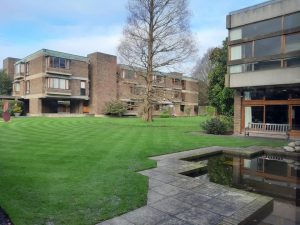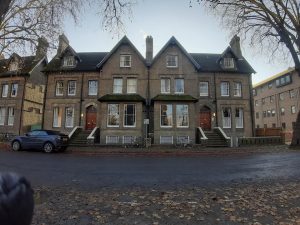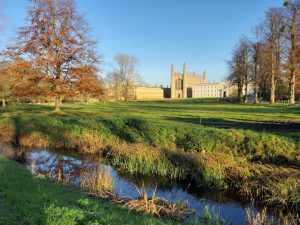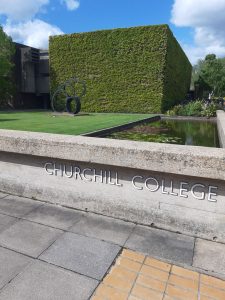
Le Service « Enseignement supérieur, recherche et innovation » de l’Ambassade de France au Royaume-Uni offre chaque année la possibilité à des chercheurs confirmés établis en France de séjourner au Churchill College à Cambridge pour une durée allant de 3 à 10 mois, afin d’effectuer une activité de recherche dans toutes les disciplines.
Les chercheurs retenus participent à toutes les activités du Churchill College en tant que French Government Fellows, soit comme By-Fellows, soit comme Overseas Fellows, selon leur niveau académique ainsi que la durée de leur séjour.
Malgré le biais sciences dures du College (voulu dès son origine à la fin des années 1950), des candidats venant des ‘humanités’ sont les bienvenus et la parité est une priorité. Le projet de recherche soumis m’a valu l’honneur d’être un des trois lauréats pour l’année 2020-2021 et nommée Overseas Fellow.
Je remercie à ce titre le Ministère des Affaires étrangères (les offres sont à chercher sur le site diplomatie.gouv.fr et auprès des Ambassades – Londres, Washington, Berlin etc.) et l’Ambassade de France à Londres, et tout particulièrement, M. Eric Tabuteau, attaché de coopération scientifique et universitaire au service enseignement supérieur, recherche et innovation, pendant mon séjour.
Le projet prévoyait d’utiliser la proximité des collections d’archives des Colleges de Cambridge (Churchill, King’s, Trinity, St John’s) et de l’Université de Londres pour compléter les informations sur l’un, voire deux, des collectionneurs de livres rare d’histoire économique, contemporains d’Auguste Dubois, professeur à Poitiers, et de commencer la rédaction d’un ouvrage consacré à l’histoire collective de ces collectionneurs.
Malgré le séjour écourté (réduit de six à trois mois par les aléas de la pandémie et des interdictions de voyage), la mission de recherche a été productive. La rédaction, qui a été retardée par le report de la consultation des archives, est en cours.
- Accueil et organisation du séjour
La bourse attribuée par l’Ambassade couvre le logement, dans un appartement F3 avec cour intérieur, au Churchill College, vaste ‘campus’ d’une cinquantaine d’hectares, à 20m à pied du centre-ville, l’un des 31 Colleges, résidences, mais aussi communautés d’enseignants-chercheurs, de l’Université de Cambridge.
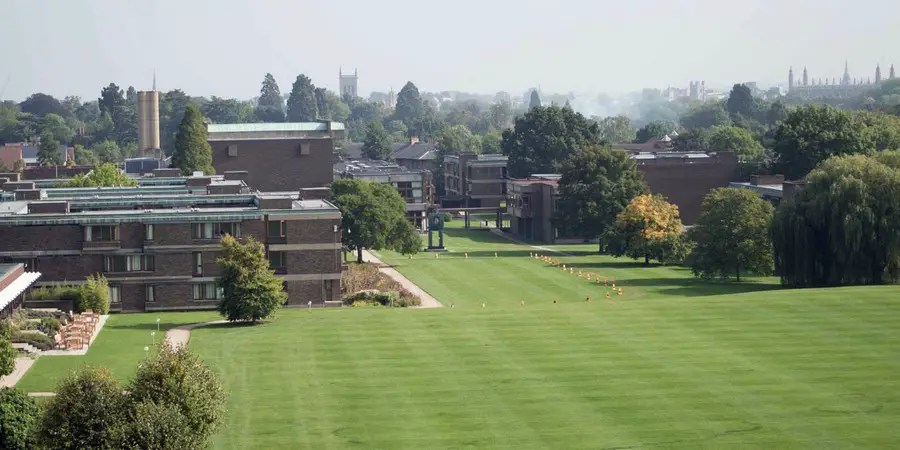 Photo : https://www.e-architect.com/cambridge/churchill-college-cambridge
Photo : https://www.e-architect.com/cambridge/churchill-college-cambridge
Les appariteurs (Porters) sont aux petits soins, 24/24, et les contacts avec les services administratifs – malheureusement seulement par mail pour cause de travail à distance – sont à la fois cordiaux et efficaces.
Pour un Fellow pendant la période du séjour, tous les repas sont gratuits – aussi bien au restaurant universitaire ou au Senior Common Room, que pour les dîners formels, servis soit dans la salle à manger des professeurs soit dans le réfectoire. Une fois nommé Fellow, on le reste à vie – avec le droit de bénéficier chaque année de quatre nuitées dans les chambres réservées aux invités et de six dîners formels (Dining Rights) et la possibilité d’y convier des invités.
N’étant arrivée que début mai, après mon 2e vaccin, obtenu non sans peine, dès fin avril, j’ai dû néanmoins, selon les règles en vigueur à ce moment-là effectuer dix jours d’isolement, et deux tests PCR négatifs avant d’être ‘libérée’. Cela dit, le pays commençait tout juste à se ‘déconfiner’ permettant l’ouverture des cafés et pubs pour un service en extérieur (avec App code QCR de fréquentation des lieux).
Le campus semblait vide, mais on m’a assuré que la plupart des étudiants (les 1ères années sont tous logées dans les résidences universitaires) étaient revenus, mais sous consignes strictes en constituant des ‘bulles’ entre colocataires des mêmes couloirs. A partir du mois de juin, les consignes devenues moins strictes et les beaux jours ont permis des activités et des rassemblements de plein air.
Les deux premières semaines furent donc consacrées principalement à prendre des contacts, organiser des rendez-vous, demander la réservation de tables dans les centres d’archives et les bibliothèques – un casse-tête, car tous n’étaient pas ouverts, les créneaux étaient réduits, et certaines semaines étaient déjà combles.
J’ai réussi néanmoins, et ce pendant les jours qui ont immédiatement suivi ma sortie de ‘quarantaine’, à rencontrer en ville (car les Colleges n’admettaient pas de ‘visiteurs’), deux personnes qui ont été essentielles par la suite, deux Bibliothécaires/Conservateurs de Fonds importants – Peter Jones et Karen Attar, et à prendre contact avec plusieurs autres, tout en utilisant les ressources en ligne que les archivistes pouvaient m’indiquer.
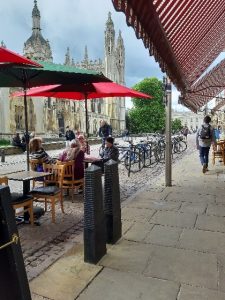 Photo : King’s Parade. S. Finding
Photo : King’s Parade. S. Finding
Ont été ainsi organisées des semaines de travail, d’abord à Cambridge, chaque semaine dans le Fonds de l’un des Colleges, puis à Londres au Fonds de l’Université de Londres, et à Oxford, ainsi que dans deux demeures historiques, Stowe et Burghley, pour suivre des pistes qui étaient en attente depuis mes précédents séjours de recherche, dans les archives de la International Institute of Social History à Amsterdam et à la Huntington Library, California.
- Manifestations scientifiques
Pendant les mois de mai et juin, j’ai participé aux manifestations suivantes, pour la plupart en ligne.
- History of Libraries Research Seminar (@HistLibraries), University of London. Sponsored by @IES_London, @ihr_history, @CILIP_lihg et organisé par Giles Mandelbrote (Lambeth Palace Library); Dr. Keith A. Manley (National Trust); Dr. Raphaële Mouren (Warburg Institute); Professor Isabel Rivers (Queen Mary).
Le 1er Juin, James N. Green (Librarian, Library Company of Philadelphia) a animé la séance sur le sujet de: `Memory, Reason, Imagination: Subject Classification in the 1789 Catalogue of the Library Company of Philadelphia’.
- Le GIS ‘Book and Print Initiative’, de la Warburg Institute, School of Advanced Studies, University of London (https://warburg.sas.ac.uk/book-and-print-initiative) m’a accueillie pour la présentation faite, le 20 mai, par Laura Cleaver, Senior Lecturer in Manuscript Studies, sur la vente de manuscrits médiévaux anglais à des collectionneurs américains au début du XXe siècle.
- Lucy Panesar, University of the Arts, Londres, m’a invitée à participer à l’atelier-rencontre en ligne qu’elle animait le 19 mai, https://festivalofempire.myblog.arts.ac.uk/2021/06/04/19-may-roundtable-video/, et de participer activement en proposant une contribution pour le projet autour du Crystal Palace, parc au sud de Londres, où fut hébergé le 1911 Festival of Empire pour le projet de commémoration (https://festivalofempire.myblog.arts.ac.uk/).
- Et à la demande d’Anny King, Fellow à Churchill et rédactrice en chef du Churchill Review (à paraître), j’ai rédigé un compte-rendu de la conversation entre le principal (Master) du College, Professor Dame Athene Donald, et Chi Onwurah, député travailliste, chargé du portefeuille Numérique, Sciences et Technologie sur les bancs de l’opposition, ,: https://www.chu.cam.ac.uk/about/events/conversations/chi-onwurah-mp/ .
Dans divers endroits, tous plus beaux les uns que les autres, j’ai pu obtenir de précieux indices et des informations inédites sur les cinq personnes et leurs collections qui forment l’objet de mes recherches.
Kashnor – archives familiales privées – grâce à des recherches généalogiques, j’ai pu rentrer en contact avec des membres de la famille du bouquiniste spécialisé à Londres, fournisseur des trois-quarts d’ouvrages en anglais assemblés par Auguste Dubois, faisant partie des fournisseurs également utilisés par les collectionneurs britanniques et américains qui ont constitué ce corpus spécifique. J’ai pu également visiter la rue, Museum Street, tout près du British Museum, où se tenait son magasin, dans l’un des quartiers renommés pour ce genre de commerce au début du XXe siècle.
Je remercie tout particulièrement Mary Melnyk, petite-fille de Leon Kashnor, pour son accueil enthousiaste et chaleureux, le partage de ses souvenirs, les manuscrits qu’elle m’a permis de consulter et l’accès aux autres membres ayant quelques bribes d’information.
Ces contacts m’ont également permis de solliciter un bouquiniste américain, ami de la famille, qui s’est montré très intéressé par le projet : Rusty Mott of Howard S. Mott, Inc. Rare Books & Manuscripts, Sheffield, MA. (Est. 1936).
Je regrette seulement de n’avoir appris son existence que maintenant, car son établissement se trouve à moins d’une heure de route de New Haven, où j’ai séjourné trois mois en 2014, pour explorer le Fonds d’un des collectionneurs, déposé à la bibliothèque Beinecke, à Yale. Il m’assure avoir encore du stock du fonds de la boutique de livres rares et anciens que se parents avaient été autorisés à acquérir par les enfants de Kashnor à partir des années 1960.
Au cours de mes recherches je me suis rendue à :
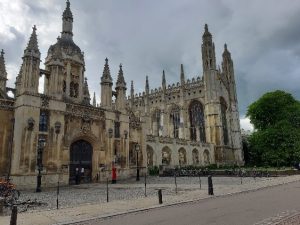 King’s College Archives, Cambridge, les archives de John Maynard Keynes, collègue et ami de H.S. Foxwell, et collectionneur lui aussi d’ouvrages anciens – mais pas d’ouvrages économiques !
King’s College Archives, Cambridge, les archives de John Maynard Keynes, collègue et ami de H.S. Foxwell, et collectionneur lui aussi d’ouvrages anciens – mais pas d’ouvrages économiques !
Photo : S. Finding
Marshall Library, University of Cambridge. Marshall Library Special Collections
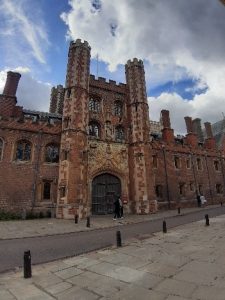 St. John’s College Library, Cambridge.
St. John’s College Library, Cambridge.
Papers of Sir Joseph Larmor GB 275, The Eagle (magazine du College, dont Foxwell a été naguère directeur)
Photo : S. Finding
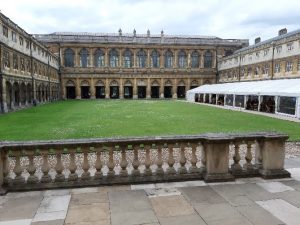 Trinity College (Wren) Library, Cambridge, Papers of Piero Sraffa 1905-1983
Trinity College (Wren) Library, Cambridge, Papers of Piero Sraffa 1905-1983
Photo S. Finding
J’ai également utilisé les fonds de la bibliothèque centrale de l’Université de Cambridge, bibliothèque de dépôt légal, pour compléter des lectures de périodiques et d’ouvrages.
Et, bien sûr, j’ai profité du Churchill Archives Centre, qui fait partie du College, qui contient, comme son nom l’indique, non seulement les archives de Winston Churchill, mais de deux autres premiers ministres britanniques : Margaret Thatcher et John Major, ainsi que la collection British Diplomatic Oral History, la collection Mitrokhin (archiviste du KGB exfiltré en 1992) et tant d’autres.
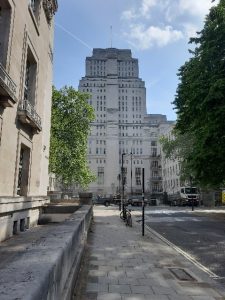
Et, à Londres, dans le quartier de Bloomsbury, j’ai utilisé les archives de la Senate House Library, University of London – Herbert Somerton Foxwell Papers.
Photo : S. Finding
et de la SOAS (School of Oriental and African Studies) National Research Library, University of London, Special Collections – Papers of Sir Charles Stewart Addis
J’ai déjà mentionné Peter Jones, Fellow Librarian, King’s College Library, et Karen Attar, Curator of Rare Books and University Art at Senate House Library, University of London, qui m’ont tous deux reçue avec intérêt, ont partagé des informations et donné des conseils et des contacts qui m’ont beaucoup aidé par la suite.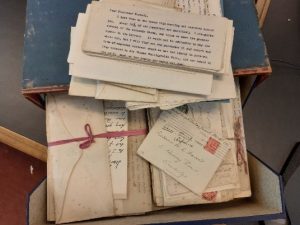 Un tiroir de classement d’origine appartenant à H. S. Foxwell avec son contenu tel quel. Senate House Library. Photo : S. Finding
Un tiroir de classement d’origine appartenant à H. S. Foxwell avec son contenu tel quel. Senate House Library. Photo : S. Finding
-Une collaboration avec Karen Attar s’ensuit avec échange de brouillons d’un chapitre/article à propos d’un des collectionneurs, et discussions autour d’un café sur le sujet. Suite à quoi, j’ai été invitée à participer à un blog de l’Université de Londres : Talking Humanities, School of Advanced Study (https://talkinghumanities.blogs.sas.ac.uk/ – un post récent évoque l’ouvrage de Gustave de Beaumont, L’Irlande sociale, politique et religieuse (1838)- à propos de l’utilité de certaines archives – en l’occurrence des reçus d’achat de livres et de relieurs se trouvant dans les archives d’un des collectionneurs – pour l’étude de l’histoire du livre.
Parmi ceux et celles avec qui j’ai eu des échanges à propos de ce projet, soit de vive voix, soit par mails interposés, je remercie tout particulièrement les collègues suivants pour leurs éclairages et discussions stimulantes :
-Prof. Eugenio Biagini, Fellow of Sydney Sussex College, Cambridge, qui a accepté d’être mon ‘garant’ pour le projet et de me procurer la lettre d’invitation ;
-Prof. Mark Goldie, FRHistS, Emeritus Fellow de Churchill College, que j’ai également rencontré, aurait pu le faire aussi. Nous fûmes étudiants d’histoire à Sussex à la même époque et avons des connaissances en commun ;
-Professor James Raven, FBA, Fellow of Magdalene College, President of the Bibliographical Society 2020-2022, coordinateur du Cambridge Project for the Book Trust, qui m’a proposé de faire une communication devant ce groupe à l’avenir ;
-Giles Mandelbrote, Librarian and Archivist, Lambeth Palace Library;
-Professor Giancarlo de Vivo, de l’Université de Naples, avec qui j’ai échangé sur mon projet et ses travaux sur un autre économiste de Cambridge collectionneur de livres ancien, Piero Sraffa, qui a connu H. S. Foxwell, A. Marshall, et J.M. Keynes.

J’ai également pu visiter deux demeures splendides, fin juin, puis fin juillet, dont les bibliothèques sont pour l’une intacte et in situ, à l’ancienne, Burghley House dans le Cambridgeshire, magnifique demeure élisabéthaine, regorgeant de meubles, de toiles de maîtres et d’ouvrages anciens ;
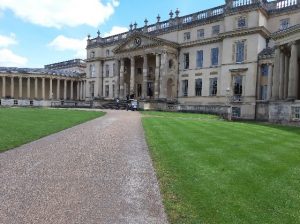
et l’autre, Stowe House, dans le Buckinghamshire, superbe résidence ayant appartenu à des acteurs politiques importants au XVIIIe siècle (les Grenville), dont la bibliothèque et les archives furent vendues, au début du XXe siècle, – et sont certainement passées entre les mains des bouquinistes et des collectionneurs qui nous intéressent.
Photos : S. Finding
-La visite de Stowe m’a permis d’entrer en contact avec plusieurs personnes supplémentaires : Anna McEvoy & Susy Pullen, de la Stowe House Preservation Trust ; Jeremy Howard, Buckingham University, ancien commissaire-priseur, historien de l’art et de collections et, Vanessa Wilkie, à la Huntington Organisation (Californie), où j’avais pu consulter les fonds en 2017, mais sans savoir que j’allais encore y avoir recours pour des informations concernant le projet en cours.
L’aide des archivistes, conservateurs et bibliothécaires pour les nombreux documents et livres que je souhaitais utiliser a été précieuse. Mes remerciements vont donc tout particulièrement à:
Alea Baker, Senate House Library Special Collections ; Dr. Patricia McGuire, King’s College Cambridge Archive Centre; Jonathan Smith, Archivist, and Steven Archer, Sub-Librarian, Trinity College Cambridge; Agnieszka Drabek-Prime & Nicola Hudson, Rare Books Superintendents, and David Chapman, of the Reference Department, Cambridge University Library; Dominique Akhoun-Schwarb, Curator of Rare Books and Manuscripts, Special Collections, SOAS National Research Library; et Emma Quinlan, Assistant Librarian (Archives), Nuffield College, Oxford.
Enfin, je dois remercier ceux sans qui tout ceci n’aurait pas été possible, les collègues de Churchill College, en particulier :Professor Dame Athene Donald, DBE, FRS, Master; Prof. Andrew J. Webber, FBA, Vice-Master; Allen Packwood, FRHistS, Director, & Madelin Evans, Archivist, Churchill Archives Centre; Dr Christophe Gagne, Teaching Fellow in French et Helen Johnson, Fellowship Secretary;
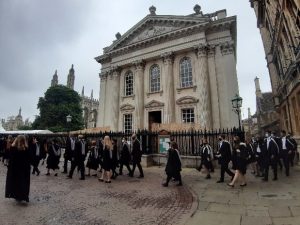 et les nombreux collègues et étudiants, toutes disciplines confondues, rencontrés lors des dîners formels qui ont eu à cœur de s’intéresser à ma présence parmi eux, et pour certains de m’inclure dans des activités hors des murs : cérémonie de remise de diplômes, pique-niques, et excursion sur la rivière Cam, jusqu’ à Grantchester, village bucolique, célébré par le poète Rupert Brooke. Ce sont :
et les nombreux collègues et étudiants, toutes disciplines confondues, rencontrés lors des dîners formels qui ont eu à cœur de s’intéresser à ma présence parmi eux, et pour certains de m’inclure dans des activités hors des murs : cérémonie de remise de diplômes, pique-niques, et excursion sur la rivière Cam, jusqu’ à Grantchester, village bucolique, célébré par le poète Rupert Brooke. Ce sont :
Professor Christopher Tout, Dr Alison Ming, Mr Graeme Morgan, Professor Ross Anderson & Shireen Anderson, Professor Peter Landrock & Marianne Landrock, Professor Marcus Kraft, Ms Anny King, Dr Franck Courbon, Dr Ewan Campbell, Rachel Stott, Dr Christopher Hicks, Professor Archie Howie, Professor David Newbery, Dr Graham Dixon & Mrs Rose Dixon, Professor Alison Finch, Dr Liz Soilleux, Dr Paul Russell, Professor Sir Mike Gregory, Professor Douglas Gough, Mrs Natasha Squire.
La page web de Churchill College donne un aperçu de l’environnement intellectuel riche et stimulant créé lors de ces rencontres.
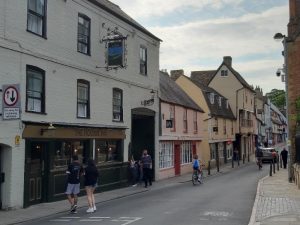
J’ajouterai que les pubs de la ville ont leur propre histoire également très riche. Ce fut à The Eagle que l’ADN a été ‘découvert’, et The Pickerell Inn où C.S.Lewis et J.R.Tolkein, avaient leurs habitudes et s’installaient pour écrire.
Je reviens le disque-dur plein de notes et de photos, prises dans les archives et bibliothèques que j’ai pu fréquenter, qui sont à présent à exploiter.
La rédaction d’une monographie est néanmoins déjà en voie – les échanges avec les collègues ayant créé le besoin de partager avec eux la partie du projet qui les intéressait – ainsi, l’introduction et deux chapitres sont quasiment terminés, un autre en cours de finition.
Le titre de l’ouvrage et la table des matières, provisoires, sont les suivants :
A Wealth of Rare Books. Collectors and Collections of Political Economy: Academics, Bibliophiles & Antiquarian Bookdealers, 1880-1940, France, Britain and the United States
- Introduction
- Auguste Dubois and the ‘république des professeurs’.
- A wealth of sources: the old book market
- ‘The smartest bookseller in London’: Leon Kashnor
- Mining for rare books: Henry R. Wagner:
- Fellow bibliographer Herbert S. Foxwell
- Transatlantic connexions: Edwin R. A. Seligman
- Conclusion
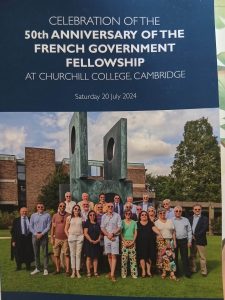








 Photo : https://www.e-architect.com/cambridge/churchill-college-cambridge
Photo : https://www.e-architect.com/cambridge/churchill-college-cambridge









